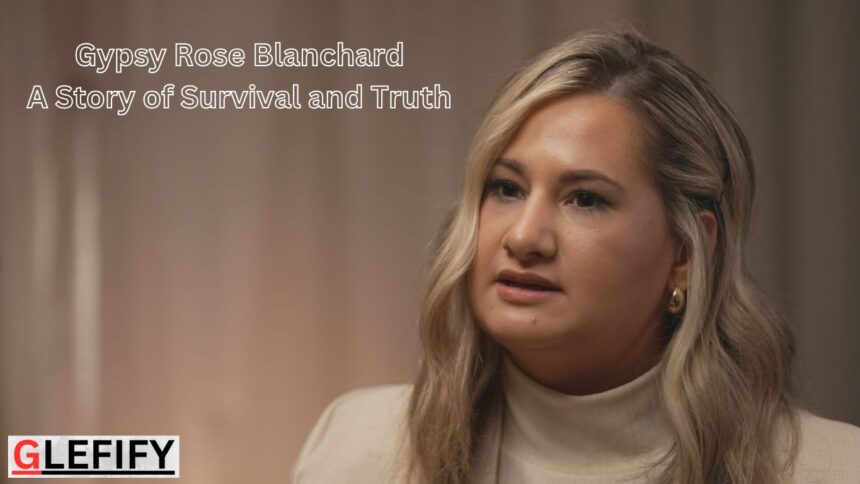Introduction.
Gypsy Rose Blanchard’s story is remarkable, especially in regard to abuse, mental health and survival. Gypsy Rose Blanchard was born and raised in a mesh of untruths as her mother Dee Dee Blanchard, a supposed loving mother manipulated her entire life, as a young girl. Due to the strange relationship that developed between virtually every child and parent, it later turned into a horrific case of Munchausen Syndrome by Proxy which is a subtype of abuse where someone intentionally tries to make someone else sick so that they become the ‘pity attention seeker’.
Having survived this kind of abusive behavior from her parents, she was able to free herself from the entanglement of her mother and embarked on the road towards recovery and being an activist. There are many who have been through similar circumstances and whose recovery would need mental health awareness have managed to draw strength from her resilience.
In this paper, we shall focus on her life and history including the important parts of hardship, life with Dee Dee and importantly how she through struggles took control of her own narrative. It is our hope that we will be able to find the answers that come out of this incredible journey of life.
Who exactly is Gypsy Rose Blanchard?
Gypsy Rose Blanchard came into this world on July 27, 1991 in Baton Rouge, Louisiana. Her mother Dee Dee Blanchard was the very reason why she was ill from birth. For example, the child’s mother has presented her daughter to the public as a lift victim and a daughter suffering from a large set of diseases, including leukaemia and muscular dystrophy. Such discontent garnered even so much interest as resulted in society’s assistance and donations for Gypsy’s treatment that she oftentimes didn’t even need.
In this web of lies now she goes by the name Gypsy Rose Blanchard, she was raised cut off from the rest of the world. Her so called mother, portrayed her in a helpless light, and neglected her daughter’s welfare by subjecting her to needless treatments. Gypsy, just like any other child, internalized concepts that her mother drilled in her head: she was always in a position to protect her. In reality however, there was not protection but the anxiety of control which was orchestrated by Dee Dee’s need to feel important and to be in the limelight. Everything changed the moment Gypsy saw things as they really are- it altered her entire reality. She was not ill, in fact her mother was a fraud who used her as a pawn. The treachery ignited a spirit of defiance in her, which would culminate in her making an audacious choice that would alter the course of her life.

Munchausen By Proxy Syndrome
Munchausen by proxy syndrome is one of the severe psychiatric illnesses in which a person who is in charge of the wellbeing of another person in this case a child does repeatedly toxic actions that causes an emotional or even physical wound for purposes of seeking sympathy from people. It most often morphs in several ways such as making a deception about having illness, exaggeration of symptoms and even the infliction of injuries on the victim. The needs that warrant for these actions may differ but most are related to instilling control or power over a subordinate and the need to prove oneself to the subordinates.
This syndrome was illustrated by Dee Dee’s manipulation of Gypsy Rose Blanchard into simulating multiple chronic illnesses and submitting to needless medical procedures. She successfully made up a fictional character in Gypsy’s head who was always in need of medical attention and care so as to present her as a sick child. It was also a method of isolating her potentially useful childhood outside the family setting.
Every single clue that gives rise to Munchausen Syndrome by Proxy ought to be looked at as it does not only concern the central immediate victims but the extended family as well as society. This disorder must be well known and understood in order to find similar cases like Gypsy’s. Family members, friends and medical professionals can develop a strategy to proactively look for these patterns of violence and aid people in the centres of these abusive environments.
The bond between Gypsy Blanchard and her mother, Dee Dee Blanchard
Gypsy Rose Blanchard and her mother Dee Dee had a very troubling bond at least that was how their relationship depicted. Deep trust and admiration for each other was the outward impression of the relationship; however there was loads of untold and complicated dynamics featuring deception and control. In her mind she was a loving mother who sacrificed everything to make her daughter healthy. In real she did nothing because she still wanted to control Gypsy’s life.
Dee Dee’s manipulation did not cease in Gypsy’s growing up years. She reduced Gypsy’s interaction with her classmates, maintaining that such a poor health condition could not allow her to join other child activities. Due to this imprisonment, Gypsy Rose Blanchard became dependent on her mother for medical care as well as friends. The extent of her endorsed falseness in which Gypsy often claimed to be sick all of the time worked to further her dependence.
A few years later, around 16 years of age, the girl began to perceive her situation differently. This abuse and the subsequent wish to be independent made her even more determined to escape. The complex interrelationship of this life and death situation of a mother and her only child should always remind everyone about the grave dangers of psychological torture and its quite severe effect on the individual all the days of their life.
Social Media Impact in the Case of Gypsy Rose Blanchard
As a consequence of her father’s actions and the public’s perception, the internet changed the way people perceived and in the ways, they would come to live. Some photographs of the couple were posted on Facebook, which led to the couple convincing themselves that they were having a good relationship. A number of photographs featuring Gypsy Rose Blanchard in various costumes earned her admiration and sympathy from strangers as well as friends.
As she grew older, instead of mere socialization, Gypsy started using social media as a tool of escape. This exposure softened some of her previously strong-held beliefs and connected her with some individuals who would diversify her thoughts. In doing so, pelvic Gypsy was also yearning to break free from her mother’s grasp.
She pioneered the animals’ rights campaign Gypsy Rose Blanchard used social media effectively to go viral with her Brescia topic. The American public showed more interest regarding this particular story, also exploring others like violence, mental illness, and complex relationships with family. Social platforms became Gypsy’s battlefield and her weapon of choice was determination to speak the truth.
The Legal Battle: Gypsy’s Arrest and Trial
Life for Gypsy Rose Blanchard changed forever on June 14, 2015 when she and her then boyfriend, Nicholas Godejohn, were implicated in the murder of Dee Dee Blanchard. For years, she had to endure her mother’s torture, but then, Gypsy decided to take a shocking step against her mother. And so ensued a legal fight which gained national attention and sparked debates on the nature of abuse and self-defense.
After the crime, Gypsy was placed in custody and she was charged with first-degree murder as well. Her trial revealed the events leading to the criminal event which involved years of psychological and physical abuse. All through her trial, Gypsy’s lawyers argued that it was fear and despair that made the girl act, depicting a picture of a torturous childhood in circumstances that oppressed her.
In 2016, Gypsy Rose Blanchard admitted to a guilty plea of second-degree murder for which she got a ten-year prison term. Although this court decision was hotly contested, it highlighted certain details present in her case and that more sophisticated thoughts were needed about power relations in the context of abuse. The events surrounding Gypsy have prompted discussions about to what extent a person can be a victim, to what extent a person has freedom of choice and how the law considers a person who is a constant victim of brutalization.
Life After Prison: Gypsy’s Journey to Freedom
After spending part of her sentence, Gypsy Rose Blanchard was released on probation in December 2021. This was a turning point in her life and for the first time, she saw a light of hope and endless opportunities. Gypsy faced challenges while transitioning to normal life out of jail, but she had her sights set on reclaiming her identity and her dreams.
One of the things that Gypsy Rose Blanchard wants to achieve is to encourage people to speak out and take care of their mental health after enduring traumatic events. One of her objectives is to promote awareness on the prevalence of emotional abuse and how to recognize signs of manipulation. In the media and in her public appearances, Gypsy Rose Blanchard tells her story, talking about the need to be sensitive and caring towards the problems of abuse survivors.
The public has often viewed Gypsy as a person who has triumphed over challenges, regardless of her circumstances. Since she was released from prison, she has taken time to interact with people who discuss ways in which mental health can be enhanced. She can be defined as a person who firmly convinces others that whatever the conditions in which a person is, he or she should always strive to get better and never give up hope.
Public Perception: The portrayal of Gypsy Rose by Media
Gypsy’s life story, as presented by the media, represented both a curse and a blessing to her personality and at the same time portrayed many contradictions in the story. Post the murder of Dee Dee Blanchard, the media’s propensity towards sensationalism made it impossible to get straight answers on the case of abuse and manipulation that gypsy rose blanchard story’s plot.
Gypsy’s story is the subject of various documentaries, television specials, and media coverage such as articles, with some of the authors seeing her as a victim while others see her as an offender. As a result, the media attention has exposed Munchausen Syndrome by Proxy and the intricacies of the parent-child relationship, but at the same time, the narrative has been boxed into one where it merely narrates crime instead of a story of survival, resilience or focus on the more complex aspects of the individual’s life where there are several interconnections.
When it comes to abuse-related matters, one should look at Gypsy Rose Blanchard’s case to understand what responsible reporting entails. It demonstrates the importance of changing the framework to one that is more compassionate and considers the lived experiences of the survivors. In this way, as there is a sustained focus on Gypsy’s narrative, there is also a focus on what lessons were acquired from her suffering and what possibility there may be for amplifying the mental health conversation.
Mental Health Awareness: Reflection on Gypsy’s Story
Here is Gypsy Rose Blanchard, whose tragic life of mental health illness can also resonate as an inspiring one where help does exist but may not always be obvious. Her case is tragic since it is almost impossible to sever emotional attachment in the roles of caregiver and patient. Life however isn’t over, understanding how the dynamics work allows for self-empowerment with the prospects of reestablishing one’s autonomy after leaving twisted relations behind.
Finally, Gypsy Rose Blanchard’s personal accounts should not only contribute to an improvement in the practice, but they also illustrate critically important aspects that can benefit the entire public and shed light on issues. Such issues focus on child protection, such as Munchausen syndrome by proxy and the impact misaligned family dynamics can cause not just to parents but also the children at all stages in their lives.
Before moving on, there are many children of those families who can try to control these things with proper education and communication. It is necessary for family members, close friends and also possible doctors attending the patient to know the patterns required for efficient intervention or support if needed.
In addition, Gypsy’s quest shows the need for having love and compassion for the survivors of abuse. There is a need to ensure that safe spaces are established where people can speak out and share their experiences without the risk of disapproval and condemnation. In this way, through creating such an environment, we would be able to prevent such abuse cases from ever happening again and make sure that those who have been abused are able to receive the necessary assistance and support.
Gypsy Rose Blanchard: Advocate for Change
Ever since her release, Gypsy Rose Blanchard has enjoyed considerable influence as an advocate in mental health space and brought awareness to abusive relationships and their consequences. She wants other people who have been through similar struggles to get help because her past has been painful. To achieve this, she participates in seminars and interviews where she benefits people by giving them hope and knowledge.
On the surface, one could view Gypsy Rose Blanchard’s advocacy as simply a testimony, however, there is so much more to it than that; she wants to advocate for awareness about Munchausen Syndrome by Proxy and the emotional abuse red flags that one should be aware of. With this, she hopes that more people would be able to gather the courage to open up and rebuild their lives again.
In the eyes of many, Gypsy’s efforts symbolize overcoming challenges and moving forward even after sustaining serious damage as she continues her campaign to educate the public on mental illnesses so that they may be tackled collectively.

Conclusion: The Continuing Influence of Gyspy’s Narrative
It is the narrative of Gypsy Rose Blanchard who grew up in dire situations, who faced her greatest nightmares and still fought for the truth until she found it. From being a scheming patient to a healing one, Gypsy has been able to support other people going through the same situations in her fight. With her some of the stories had sparked conversations about pornography, violence, mental illness, and the tangles of caregiver relationships.
When we consider how Gypsy may have contributed to society, we realize her life is not only about her but about her people. It therefore encourages us to acknowledge emotional abuse as a phenomenon and to work towards building a culture of compassion. Her goal was not to help herself, but to help people like her, who were able to seek some form of help outside of their silence. In this process, she has paved the way for other individuals who were in the same circumstances as her.
Gypsy Rose Blanchard’s story appears to hold an interest to many and further ages the email discharge finishes inspiring activism. There is something to be learned and applied from the life of Gypsy Rose Blanchard. However, readers should still be tactful about the plight that Gypsy Rose Blanchard continues to go through.
FAQ section
Q1: Where is Gypsy Rose Blanchard now?
In the year 2015, Gypsy Rose Blanchard was freed from the clutches of a murdering and abusive mother Dee Dee Blanchard who had abused her for a long period. She has served her jail sentence of 10 years and has been out on parole since the December of 2021.
When a parent manipulates their child in such a way so that the child is made sick or cared for in a comforting manner, the condition is termed as Munchausen Syndrome by Proxy also known as Factitious Disorder Imposed on Another (FDIA). It could be damaging to the individual who has undergone it.
Q3: What were the key actions taken by Gypsy Rose Blanchard when she faced abuse?
Finally, she was able to bring herself and proceeded to take several actions including suing her own mother to get what she deserved. It was perhaps her partner that helped her fantasize about living free of the societal constructs that made her kill Dee Dee.
Q4: What has Gypsy Rose Blanchard been up to after she was freed from prison?
After her release, Gypsy Rose Blanchard’s focus has been on raising mental health awareness and encouraging people against abuse. Her primary approach is sharing her story so that everyone else can better relate to the complexities of caregiver and recipient interactions.
Q5: What can we draw from the experiences of Gypsy Rose Blanchard’s life as per the documentary?
With the numerous experiences in her life, she has so many lessons to share such as being able to identify certain signs related to emotional abuse; a growing urge towards raising awareness for mental health; being strong people who have been through traumatic events and don’t shy away from speaking about it. This definitely is an eye opener that there is hope for recuperation and it has to be aided by a support system.







